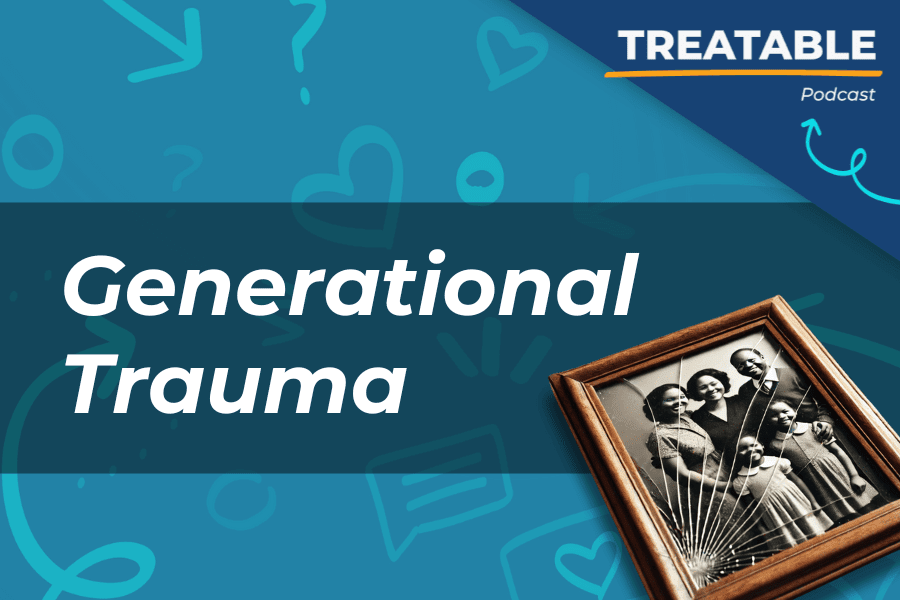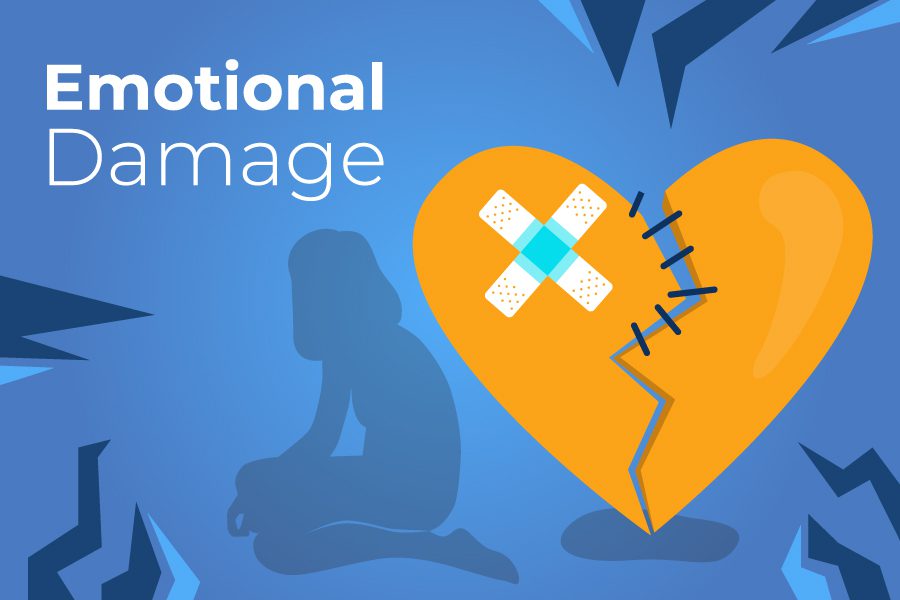Generational Trauma
What Is Generational Trauma?
Generational trauma refers to the psychological effects of trauma that are passed down from one generation to the next.
Even if descendants don’t directly experience the original trauma, they may still exhibit emotional or psychological symptoms tied to it, especially as they learn fears, responses, and coping mechanisms from their caregivers.
Generational trauma is sometimes called “family trauma,” but it can be used to refer to any type of bonded community that experience traumatic events or behaviors, even if they are not directly related.
The psychological and emotional effects of traumatic events can be passed down over time through teaching that stems from feeling unsafe or unstable.
These effects can often cause intense challenges for future generations and can last for centuries if left untreated.
Generational trauma may be seen in families with trauma survivors who have experienced oppression, racism, discrimination, or violence.
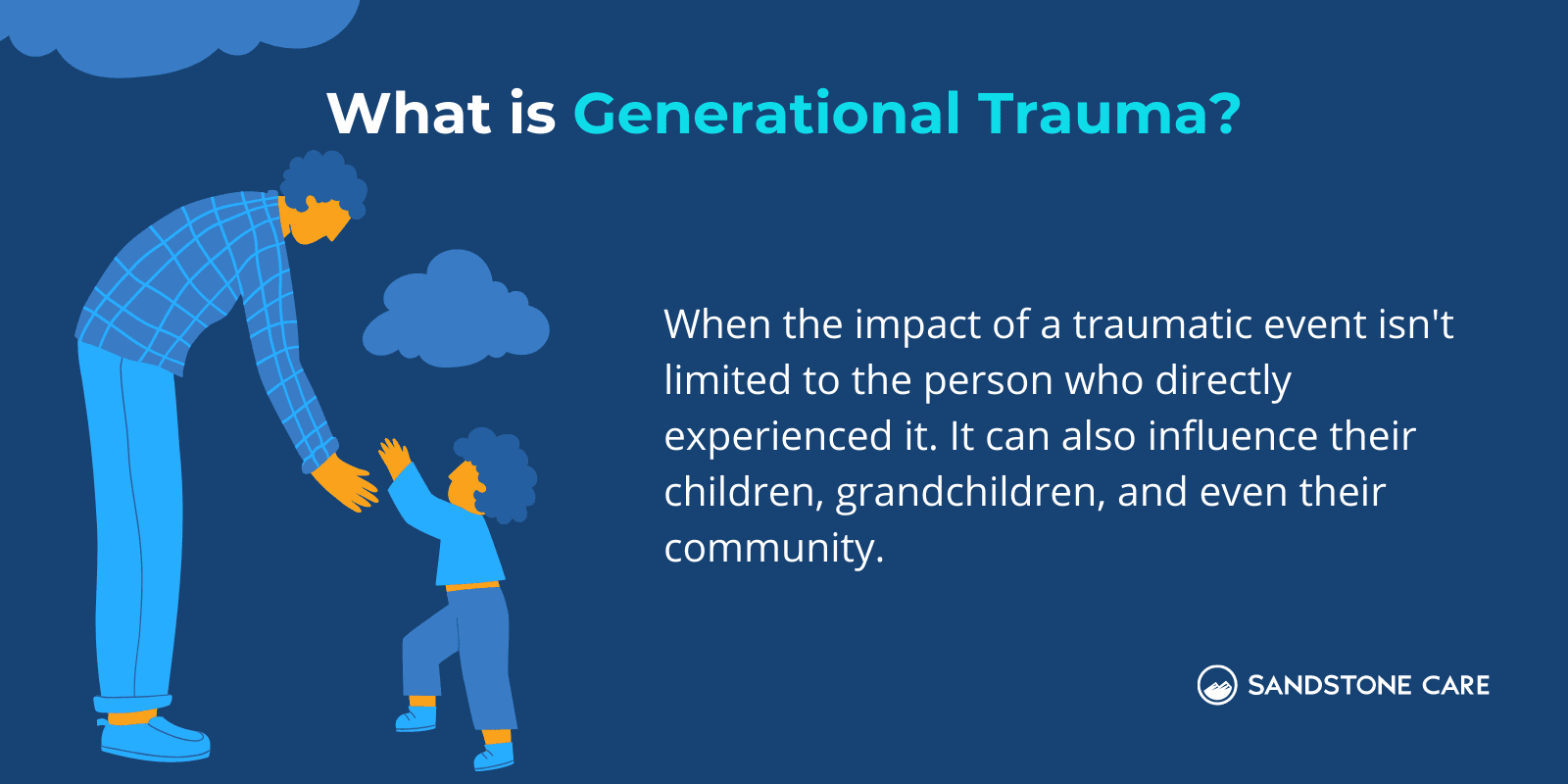
Is Generational Trauma Real?
Yes. Research shows that the effects of trauma can be passed down to children; this is known as transgenerational trauma.
Transgenerational trauma is a real thing that causes real, devastating effects on individuals and their family members. Mental and emotional struggles are often minimized by those who do not experience them firsthand.
However, both documented experiences and scientific research indicate that the shockwaves left by traumatic experiences can continue beyond one lifetime.
How Do You Uncover Generational Trauma?
Generational trauma can be seen in individuals through various symptoms such as anxiety, depression, low self-esteem, or self-destructive behaviors.
Relationships within a family with generational trauma may involve codependency or unhealthy attachment styles. These attachment styles can cause dysfunctional family dynamics that can perpetuate the effects of generational trauma.
To uncover generational trauma, you must first identify where the traumatic responses are coming from. The sources of generational trauma, such as systematic discrimination, can be difficult to uproot, even after they are identified.
The second step is to acknowledge the trauma and its impact on your life non-judgmentally. Feelings of guilt or shame can make symptoms worse.
Then, it is essential that families and communities experiencing the collateral of generational trauma seek professional support. For example, this could look like family therapy under the guidance of someone in the psychiatry field.
After learning coping strategies and finding effective support systems, it becomes possible to heal.
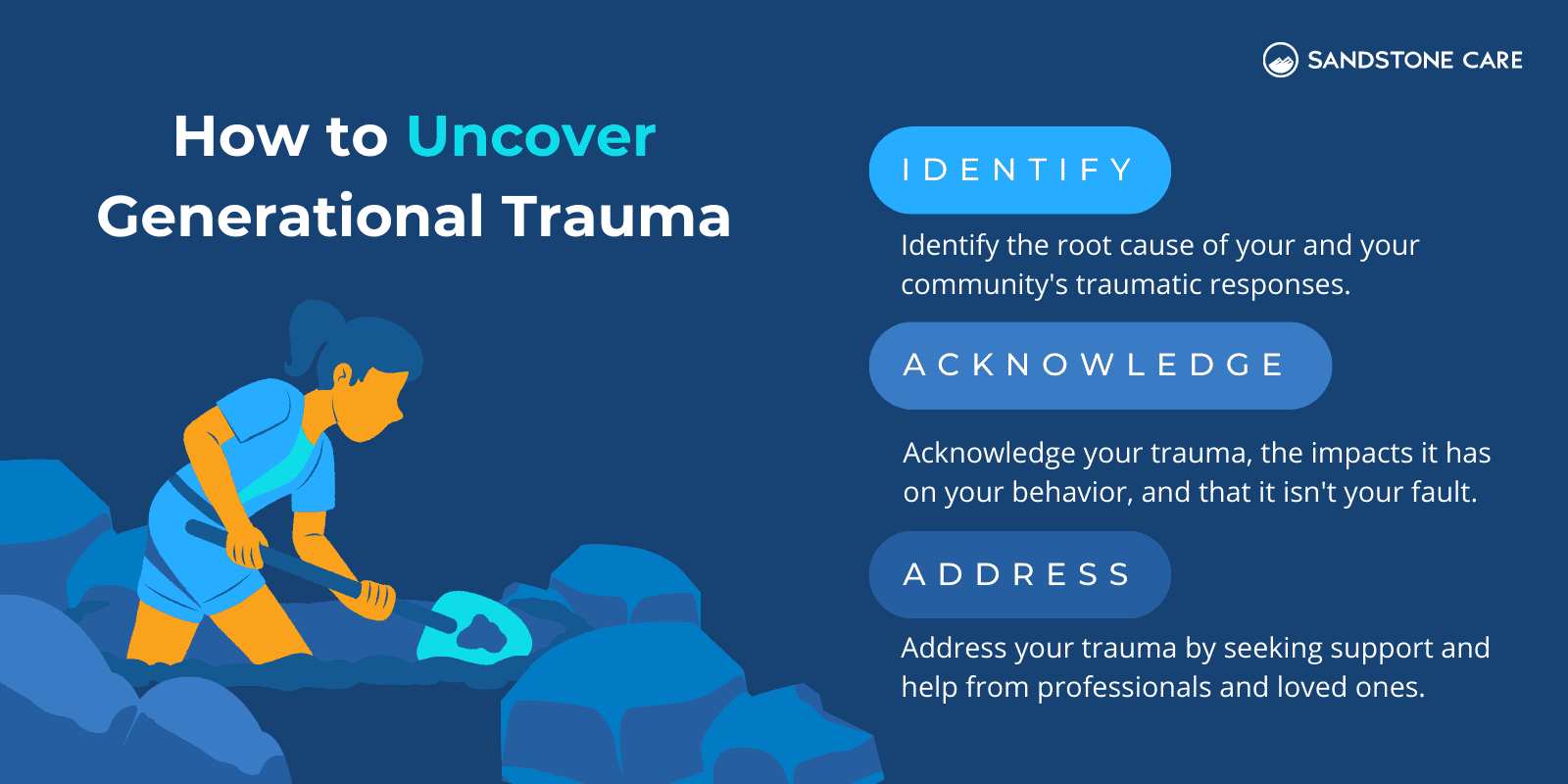
What Does Generational Trauma Feel Like?
Generational trauma can feel different for each individual. However, it can make a person have a hard time trusting others, feel very hopeless about the future, or cause them to experience feelings of anxiety and depression.
It is also important to note that generational trauma can feel different in the same person at different stages of life.
For example, the impact of unhealthy family dynamics will likely look very different to a young child than it does to an adolescent or an adult who no longer lives at home.
Does Every Family Have Generational Trauma?
No. Not every family experiences generational trauma.
However, generational trauma can be more common than many people think. Generational trauma does not always have to involve one big traumatic event.
It can also happen in families who display a pattern of abuse or have experienced prolonged, complex trauma from things like economic instability or domestic conflict.
Sometimes generational trauma can continue to happen as people attempt to push away the effects of trauma, where the recovering family members experience a type of survivor’s guilt as they break the generational cycle.
How Trauma Gets Passed Down Through Subsequent Generations
How Is Trauma Passed Down Through Generations?
It is believed that intergenerational transmission of trauma can be passed down through genetic changes to a person’s DNA after they experience trauma. These effects are called “epigenetic changes.”
Research shows that DNA can “remember” traumatic experiences and then pass down the effects of those experiences to multiple generations. However, DNA does not carry memories of events and emotions in the same way that the mind does.
In the same way that a tree “remembers” the cut of an ax as it grows with the cut mark, future generations can carry the scars of generational trauma even if they did not experience it firsthand.
The legacy of Trauma may also be passed down culturally. Over the years, family members may learn unhealthy behaviors from their parents or other family members, imitate the behaviors, and eventually teach those behaviors to their children.
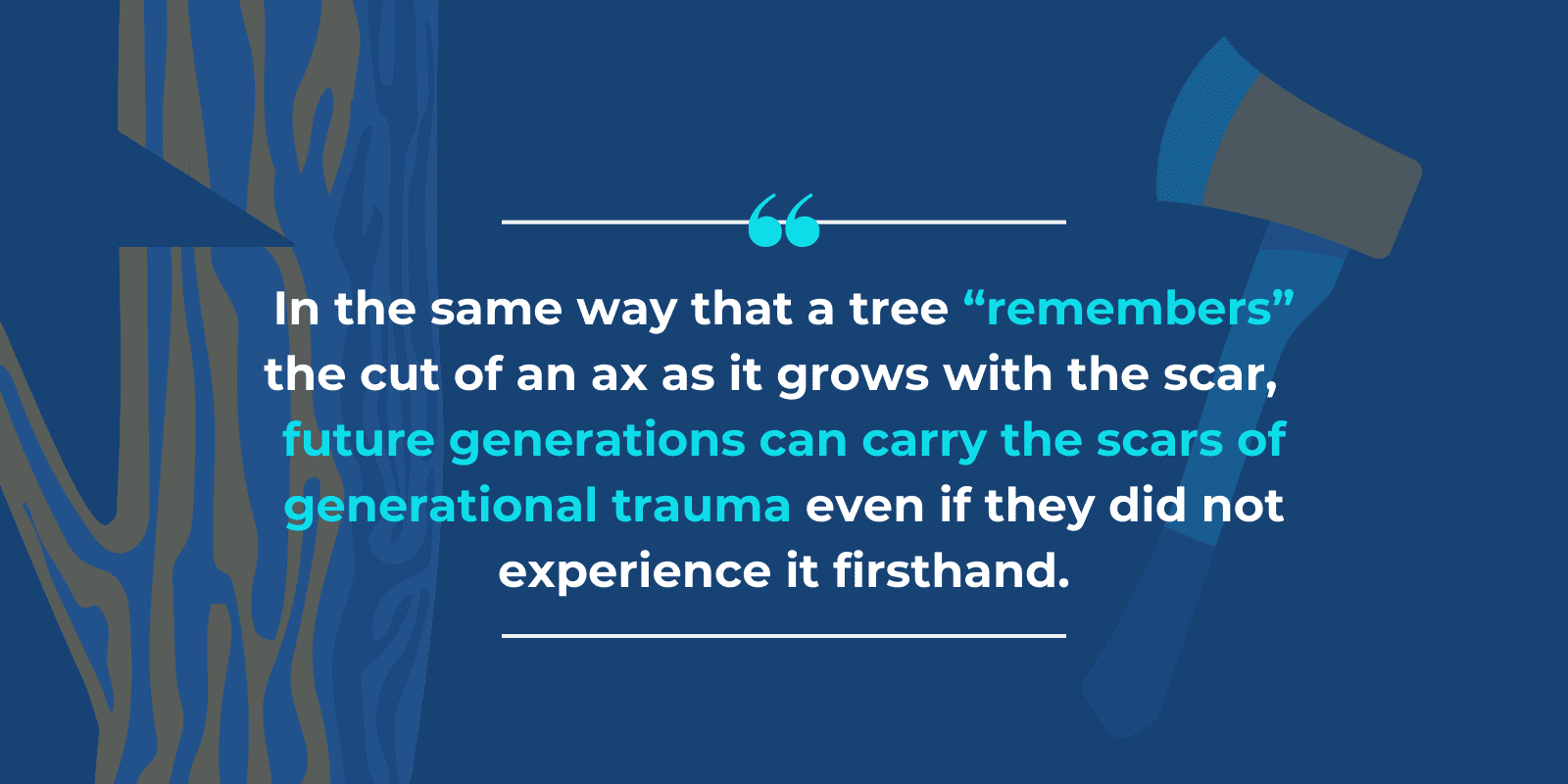
What Are Three Causes of Intergenerational Trauma?
The three main causes of generational trauma include extreme events, abuse, or prolonged periods of discrimination and suffering.
However, any type of trauma can trigger generational impacts depending on how the victims learn to cope with its effects.
Common causes of intergenerational trauma can include:
- Domestic violence
- Childhood trauma
- Physical, emotional, or sexual abuse
- Oppression
- Racism
- War
- Religious Trauma
- Natural disasters
- Genocide or slavery
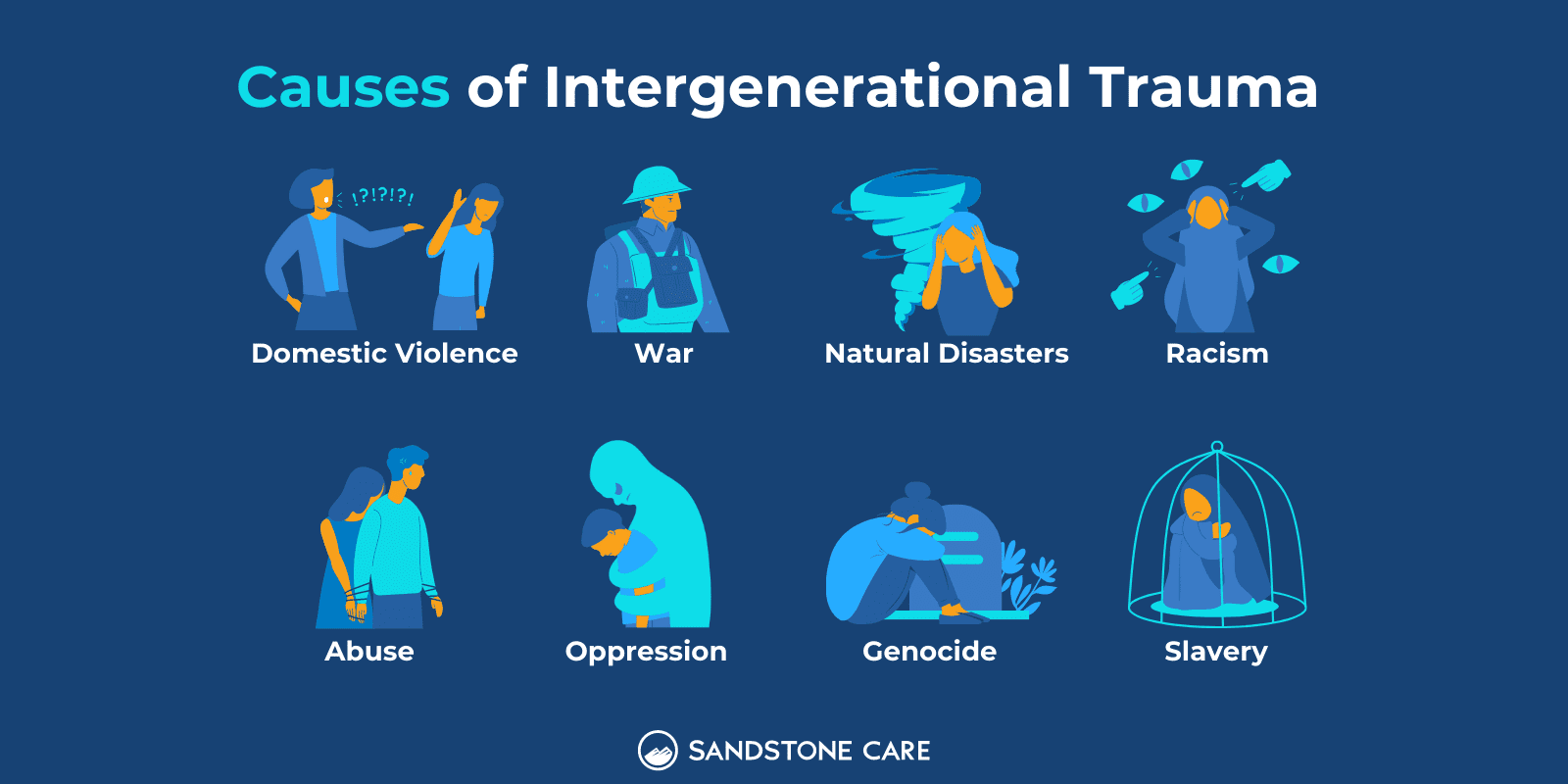
What Is the Typical Course of Intergenerational Trauma?
Generational trauma typically starts with adverse childhood experiences, such as child abuse, which then impact how the victims take care of and teach the next generation.
When victims become adults, experiences such as childhood trauma impacts their decisions, how they feel, and even the way they perceive and handle relationships.
As these victims begin families or communities of their own, they carry with them the “survival skills” they were forced to acquire growing up in an unsafe environment.
These skills can include things like hyper-vigilance, people-pleasing, defensiveness, and more.
As they become parents and leaders, the collective trauma and its effects are then be passed down to their children, their children’s children, and so on.
How Do You Get Generational Trauma?
Generational trauma can be passed down both genetically and culturally.
Traumatic responses are often thought of as being completely tied to personal experiences. However, research shows that generational trauma can get passed down through a person’s DNA to their offspring through epigenetic changes.
When a person or group of people experience traumatic experiences like war, racism, sexism, natural disasters, abuse, or oppression, the effects of the trauma can get passed down through generations, even when later generations have not experienced it firsthand.
Is PTSD Inherited?
PTSD is not directly inherited, but genetics can make someone more likely to develop PTSD after a traumatic experience.
Some people may inherit traits that affect how they handle stress and fear, which can increase their risk of PTSD. A family history of mental health issues like anxiety or depression can also make PTSD more likely.
Generational trauma, where the effects of trauma are passed down through families, can play a role too.
This means that trauma experienced by one generation may impact the mental health of future generations, increasing the risk of PTSD.
What Is Evidence of Generational Trauma?
Generational trauma may be present in individuals and families who display signs of:
- Codependency
- Unhealthy attachment styles
- Hypervigilance
- Difficulty trusting others
- Mental health conditions
- Substance abuse
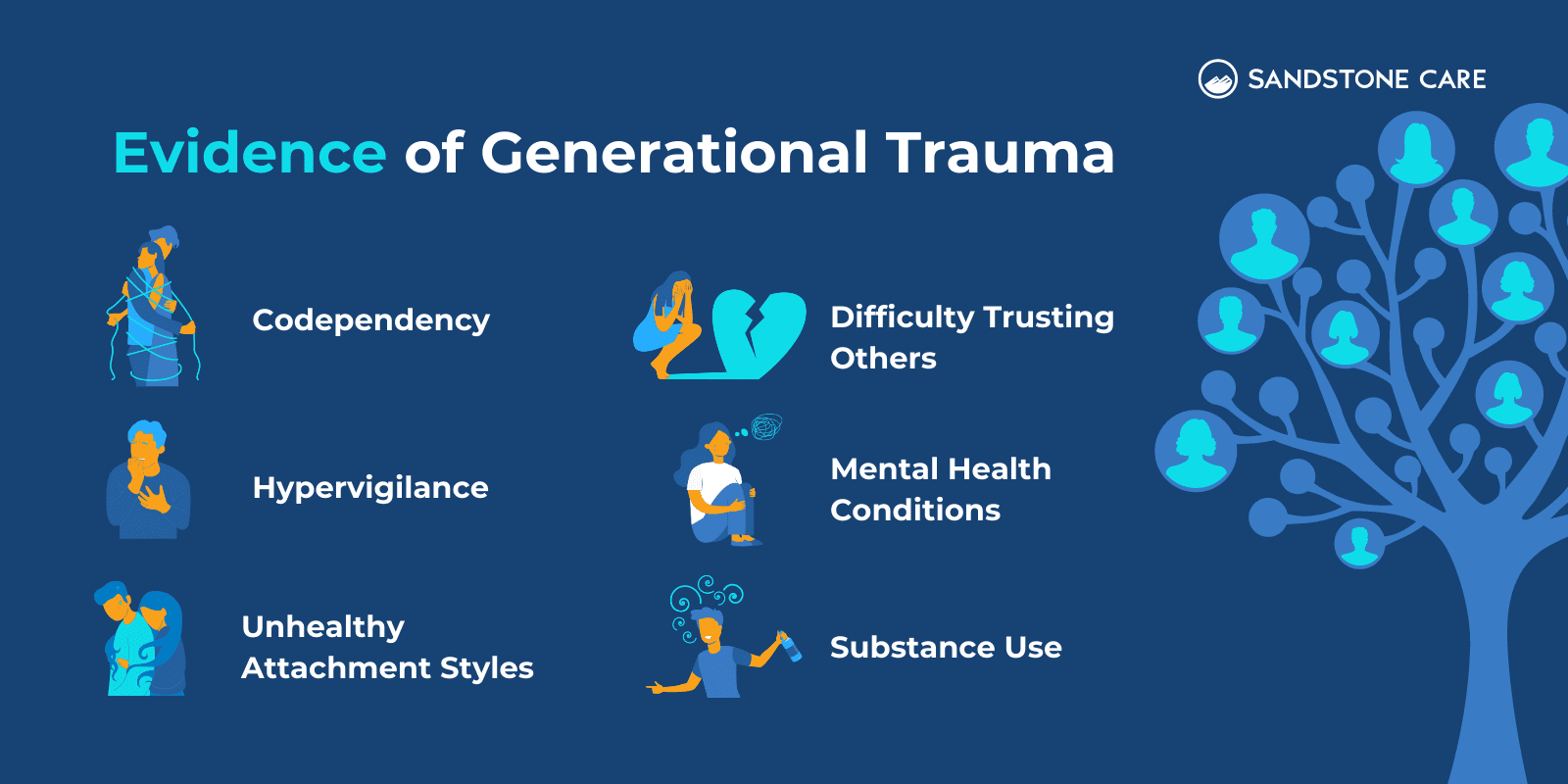
Generational Trauma Patterns
What Are Generational Trauma Patterns or Cycles of Trauma?
Generational trauma patterns or cycles of trauma are unhealthy behaviors and relationship styles that are passed down through families when trauma isn’t properly healed.
When a closely-knit group experiences a significant trauma, like abuse, violence, or discrimination, the emotional impact can affect future generations, even if they didn’t directly experience the first traumatic event themselves.
Common generational trauma patterns include:
- Avoiding emotions
Family members may avoid talking about feelings or the trauma, leading to emotional suppression. Without a healthy example of how to communicate, the next generation will likely continue to suppress their own emotions. - Unhealthy coping
This can show up as substance abuse, aggression, or withdrawing from others to manage stress or pain. These behaviors quickly turn into cycles of anger and distrust throughout multiple generations of a community. - Trust and relationship issues
People may struggle to form healthy relationships because of unresolved trauma, including their relationships with their parents and children.
Family members may follow the same patterns as their parents or grandparents, even without consciously realizing that they are mirroring those behaviors.
It is incredibly difficult to break a cycle of generational trauma because it is often deep-rooted and widespread across multiple parts of their life, especially when the trauma affects their entire community.
When everyone around them is using the same unhealthy ways of communicating and processing their emotions, it is nearly impossible for a young member of a traumatized community to learn a better route without getting external help.
However, it always is possible to break these patterns and heal from the trauma that has been present throughout the history of your family and community.
Finding support groups and exploring therapy options can help you to get a perspective that steps outside of the broken lens of generational trauma in order to help you find what skills you need to live a healthier life.
What Are the Symptoms of Generational Trauma?
Common symptoms of generational trauma can include:
- Hyper-vigilance
- Difficulty trusting others
- Low self-esteem
- Fear of death
- Hopelessness
- Substance abuse problems
- Mental health disorders
These symptoms can be seen across multiple generations, even if their specific behaviors differ depending on personal circumstances.
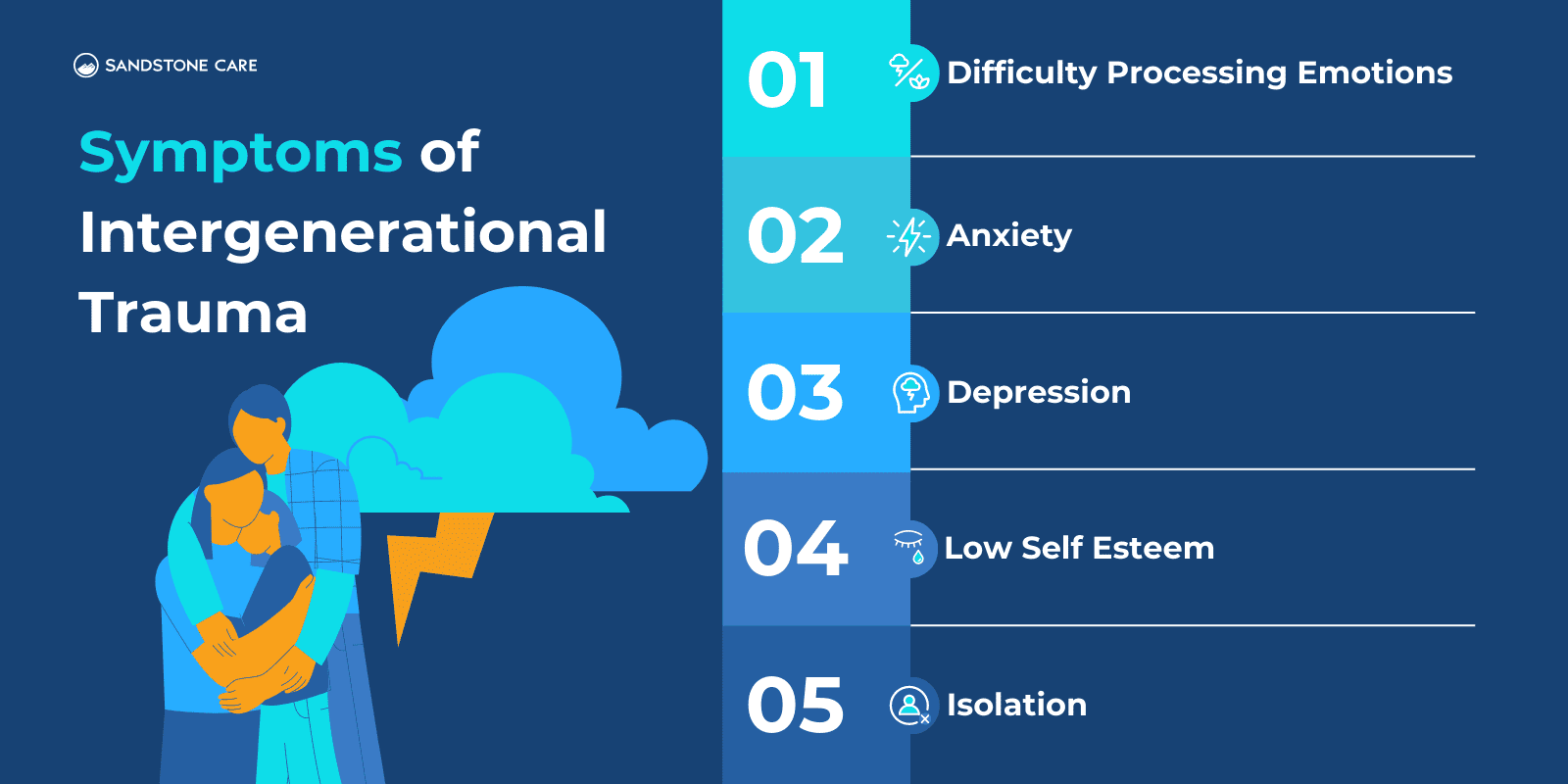
What Are 5 Key Symptoms of Intergenerational Trauma?
There are many symptoms of intergenerational trauma, however, there are five distinct symptoms that are very common in traumatized families and communities.
Individuals with generational trauma can have difficulty processing and communicating their emotions. They also often experience anxiety, depression, low self-esteem, and isolation.
Examples of Generational Trauma
What Counts As Generational Trauma?
Generational trauma happens when traumatic experiences and their effects are passed down from one generation to another.
Generational trauma can be different and unique to each and different groups of people. While something may not seem severely traumatic to someone from an outside perspective, the mental, emotional, and interpersonal damage is very real.
Some people may have generational trauma from one single incident; others may have it from long and repeated experiences of different traumatic experiences.
What Is an Example of Ancestral Trauma?
One of the most well-known cases of generational trauma dates back to the mass enslavement of African Americans.
The violence, oppression, discrimination, and racism towards African Americans for generations have had lasting impacts on individuals in the community. Descendants of enslaved peoples experience higher rates of fear, hopelessness, anger, anxiety, helplessness, mental health problems, and more.
Another example of generational trauma is when children of Holocaust survivors experience extreme stress beyond their personal life experiences. For example, they may practice survivalism even though they are generationally removed from the Holocaust.
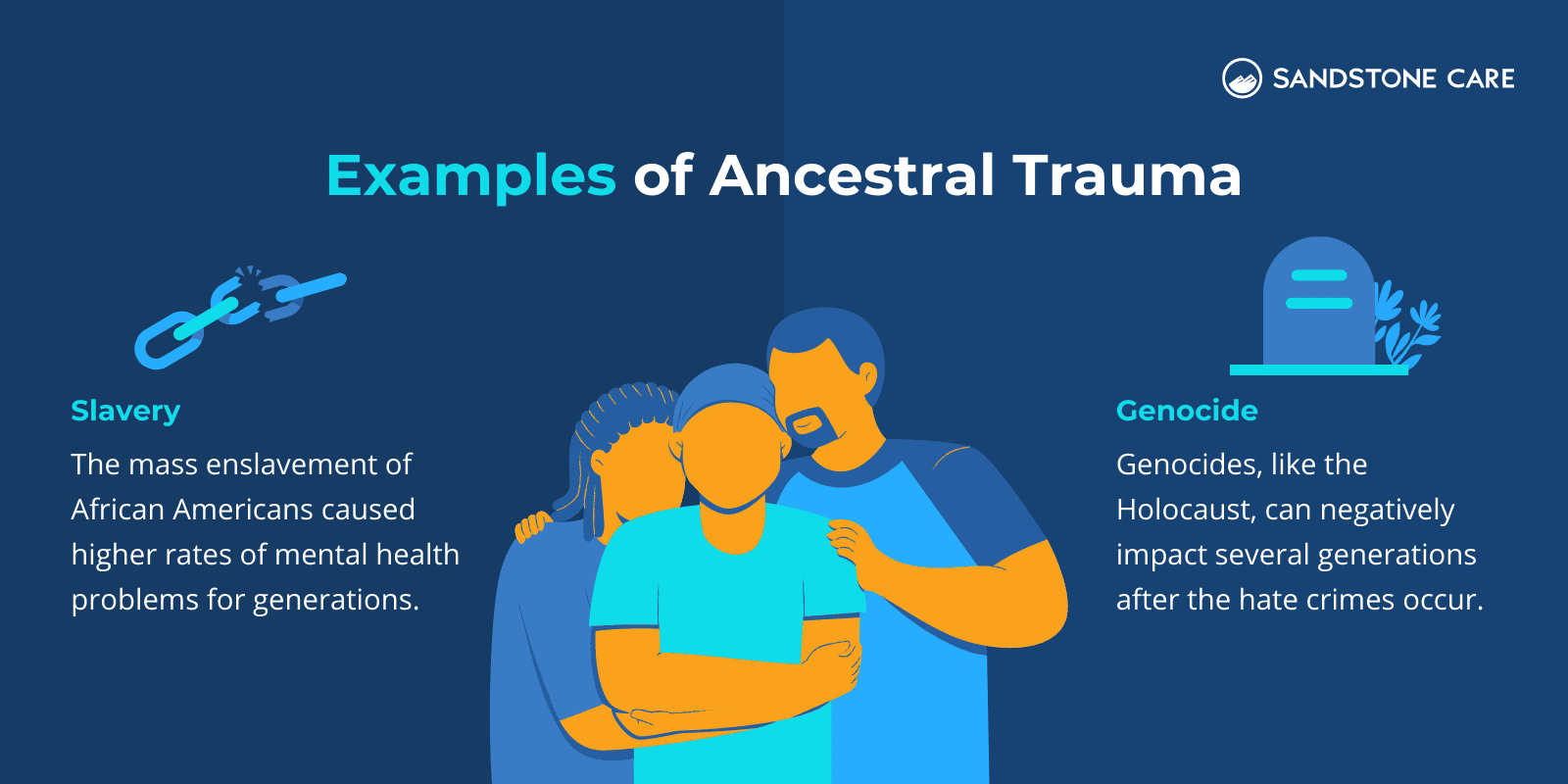
Effects of Generational Trauma
What Are Some of the Consequences of Generational Trauma?
Some consequences of generational trauma include:
- Denial
- Detachment and disconnection
- Low self-esteem
- Trauma bonding
- Neglect
- Abuse and violence
- Difficulty communicating
- Broken or self-sabotaged relationships
Generational trauma can challenge the mental health and overall well-being of those who experience it.
It can lead to mental health conditions like anxiety, depression, and suicidal ideation.
If you or a loved one are experiencing suicidal thoughts, seek help immediately. Know that you are not alone and there is support for you. You can call the National Suicide Lifeline at 988 or call 911.
What Are the Mental Health Issues with Generational Trauma?
Some mental health issues associated with generational trauma can include anxiety, depression, and post-traumatic stress disorder (PTSD).
A person with generational trauma may experience feelings of shame, helplessness, and low self-esteem.
They may have negative thoughts and feelings about themselves and the world around them based on the experiences they, or their loved ones, have gone through.
It can also be hard to regulate your emotions and manage stress where underlying trauma has been unaddressed and present for so long. Some patterns may feel invisible to those who use them, since they have been a part of their entire lives and the lives of their family members.
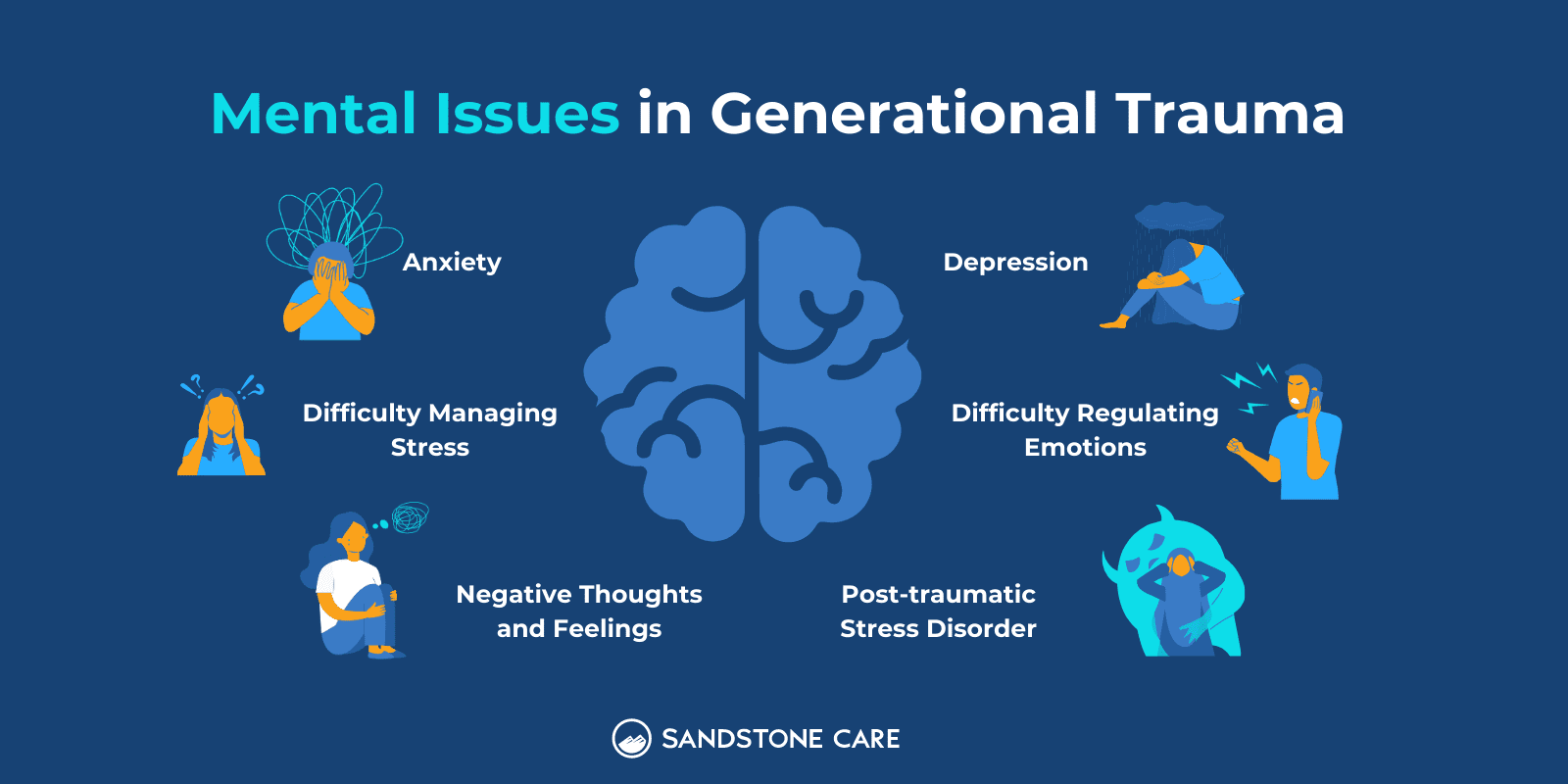
What Are the Lasting Effects of Generational Trauma?
Generational trauma can also put a person at a higher risk of mental health conditions and substance use problems, including addiction.
Prolonged exposure to stress and trauma can put a person at risk of severe mental and physical health conditions. Toxic family dynamics, for example, can put a near-constant strain on family members.
What Are the Physiological Effects of Intergenerational Trauma?
Both stress and trauma can increase the chance of a person having chronic pain, illnesses, and conditions like heart disease and diabetes.
Generational trauma can also lead to unhealthy behaviors, including substance use disorders and addiction.
Some people may turn to substances and alcohol to cope with unacknowledged or suppressed feelings and trauma that may be underlying. As a result, it can lead to unhealthy cycles that can be passed down to other generations.

What Are the Neurological Effects of Intergenerational Trauma?
Communications Biology states, “Intergenerational trauma increases lifetime susceptibility to depression and other psychiatric disorders.”
Over time, stress and trauma can rewire the brain and alter the activity of important systems which impact a person’s emotional, mental, and physical well-being.
Can You Get PTSD from Generational Trauma?
Generational trauma may lead to symptoms related to post-traumatic stress disorder (PTSD).
Common symptoms of PTSD can include:
- Agitation
- Nervousness and anxiety
- Difficulty concentrating or thinking
- Memory problems
- Mood swings
- Depression
- Nightmares
- Unwanted memories of trauma
- Avoidance
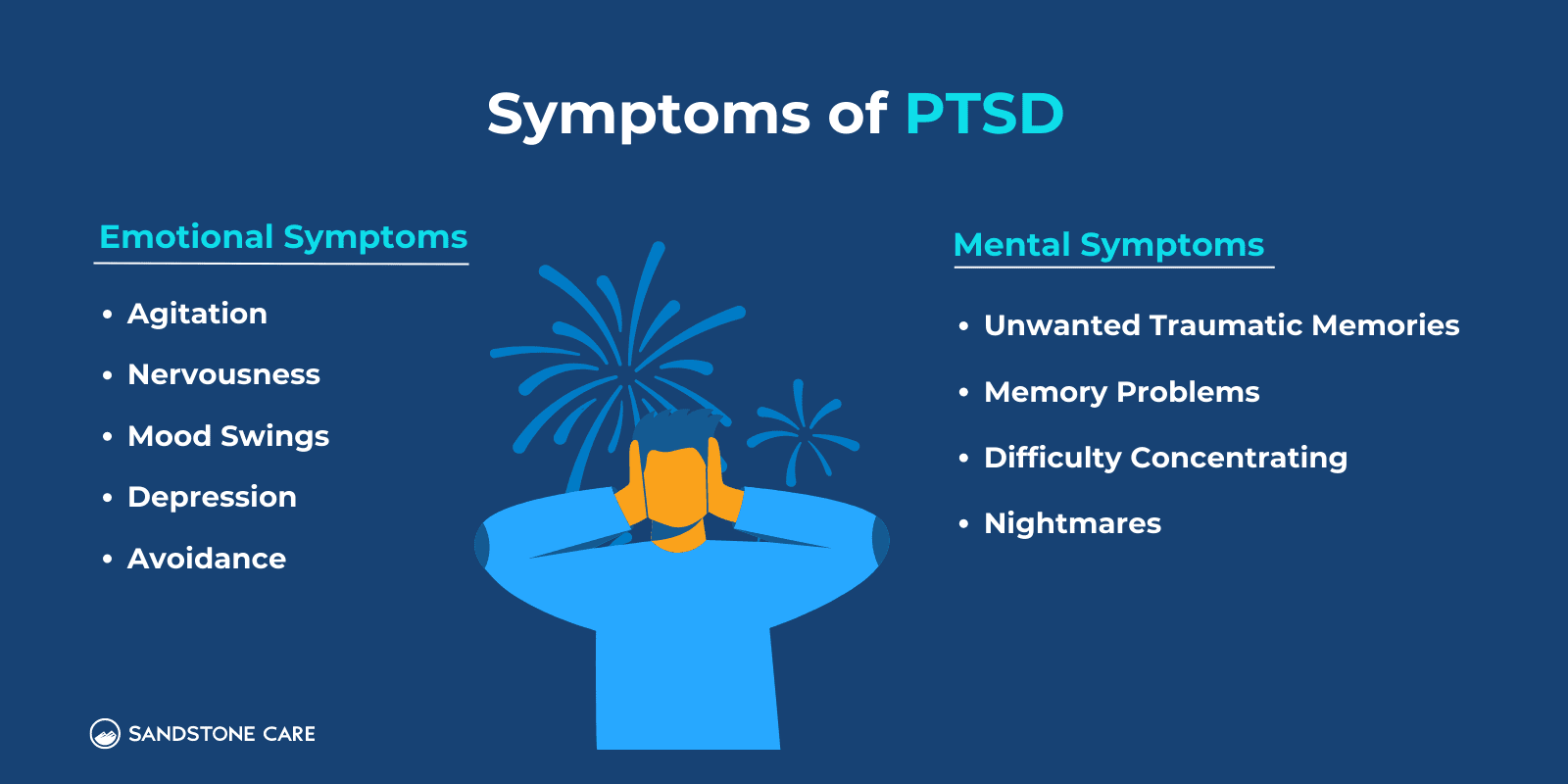
Breaking Generational Trauma
Is It Possible to Break Generational Trauma?
It is possible to break the cycle of generational trauma.
Breaking generational trauma takes intense work and effort.
To break generational trauma, a person has to understand the underlying problem, learn how to work through it, and learn ways to prevent and treat the root cause of the problem so that the patterns do not pass to the next generation.
How to Clear Ancestral Trauma?
Clearing ancestral trauma starts by recognizing its influence on your behaviors and emotions. Understanding your family’s history is key to identifying how trauma has been passed down.
Ancestral trauma, also known as generational or intergenerational trauma, refers to emotional and psychological wounds passed down through families due to significant past trauma, like war, abuse, or systemic oppression.
For example, seeking therapy such as EMDR (Eye Movement Desensitization and Reprocessing) can help process traumatic memories from past generations.
Mindfulness practices like deep breathing or guided meditation can increase self-awareness of inherited trauma, while journaling about family patterns and experiences can help uncover emotions tied to that trauma.
Replacing harmful coping mechanisms—such as avoiding emotions or using substances to numb pain—with healthier habits like regular exercise or talking openly with trusted friends or therapists can also aid healing.
What Are the Signs of Breaking Generational Trauma?
Signs a person is breaking generational trauma patterns can include:
- Ability to express and talk about their emotions
- Being more open to trusting others
- Decreased time isolating themselves and increased time spent with others
- Ability to face their fears
- Not being afraid of change
- Feeling more connected with themselves and family members
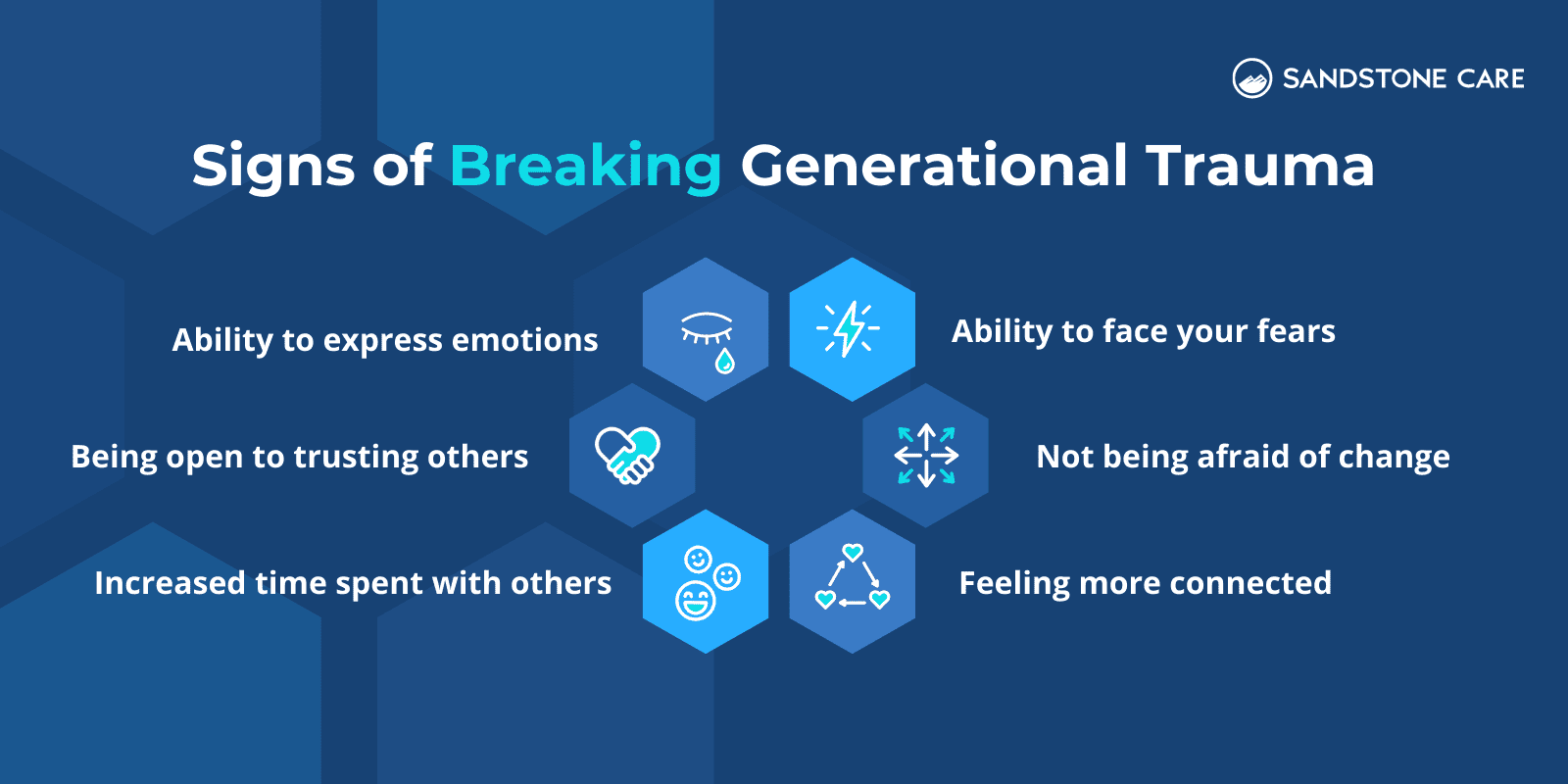
What Are 3 Things That Can Be Done to Help Break Generational Trauma?
One of the most significant ways to break generational trauma is by openly and honestly communicating with your children and other family members or caregivers.
Another way is to try to observe and gain awareness of your family’s patterns and whether you contribute to these patterns too. Only by uprooting the patterns you have learned from previous generations can you begin to teach younger generations how to heal.
Lastly, talking to a trauma therapist and learning healthy ways to cope and work through the trauma can give you the tools to work towards healing.
Is It Hard to Break Generational Trauma?
Breaking generational trauma is not easy to do.
It can take a lot of time, patience, and effort and can be emotionally difficult. However, you do not have to do it alone.
But, having support and learning new ways to cope and heal can help you improve your health and well-being, little by little.
Does Generational Trauma Go Away?
Generational trauma, like an untended wound, does not go away on its own.
Additionally, unacknowledged and unresolved trauma can get worse over time. It can also become worse as more and more generations become entrenched in unhealthy coping patterns. However, with support, it is possible to break the patterns that have impacted your family and community.
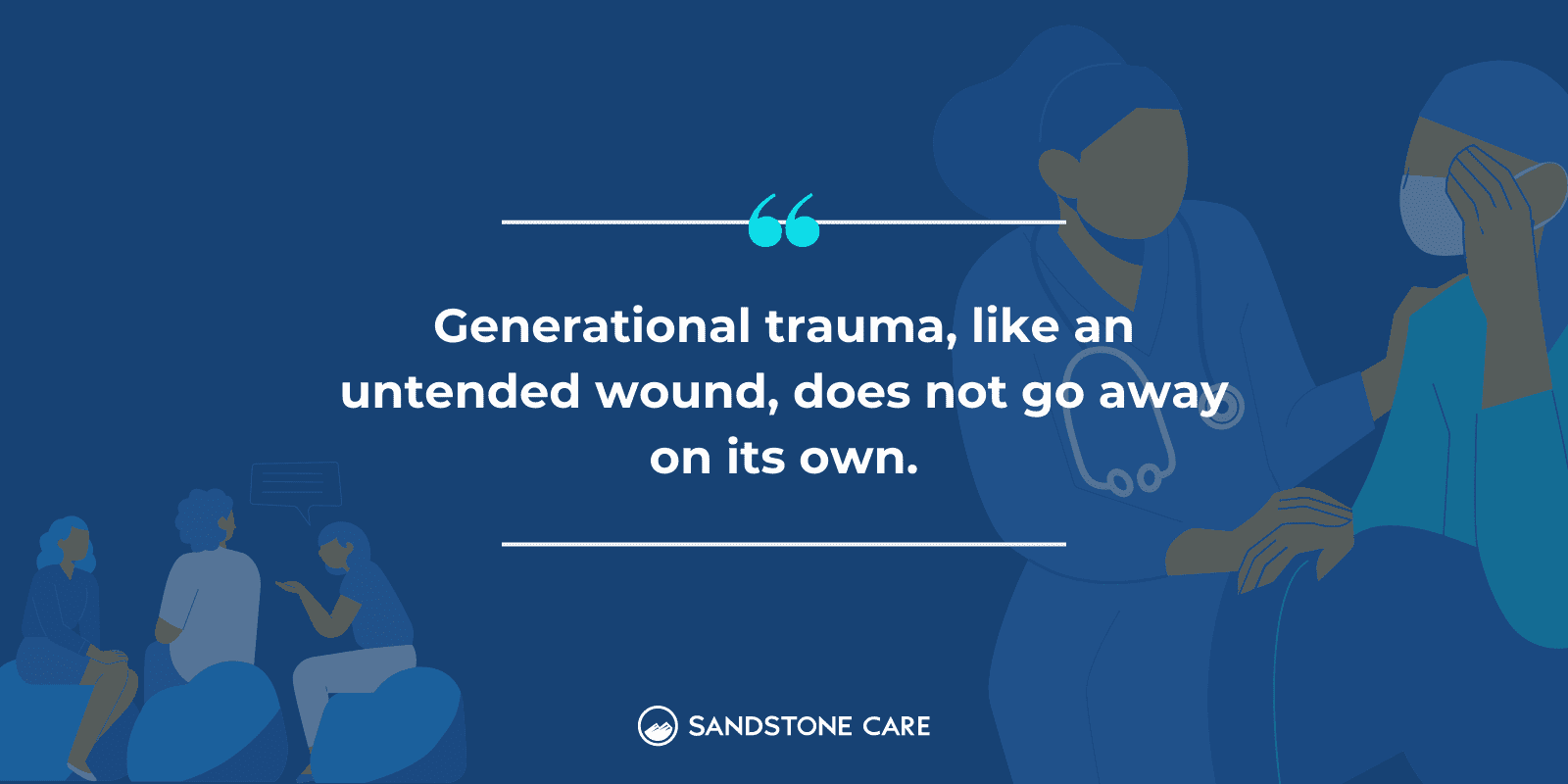
Healing Generational Trauma
Can Generational Trauma Be Healed?
Generational trauma does not have to keep going forever.
A person can heal from generational trauma and break the patterns in their own family. It is difficult to be the first person to end the chain of trauma-based behavior, but it is a valuable way to help protect communities from the harm of generational trauma.
How Do You Start Healing Generational Trauma?
Taking the step to start healing generational trauma can be a big one, but some ways to start can involve:
- Finding the root source of the trauma
- Accepting the trauma
- Working on being open to change
- Practicing self-care
- Allowing yourself to grieve and process your emotions
- Seeking professional support and trauma treatment
Trauma-informed care can be a practical and effective approach for individuals with generational trauma and focuses on understanding, acknowledging, and responding to a person’s life experiences.
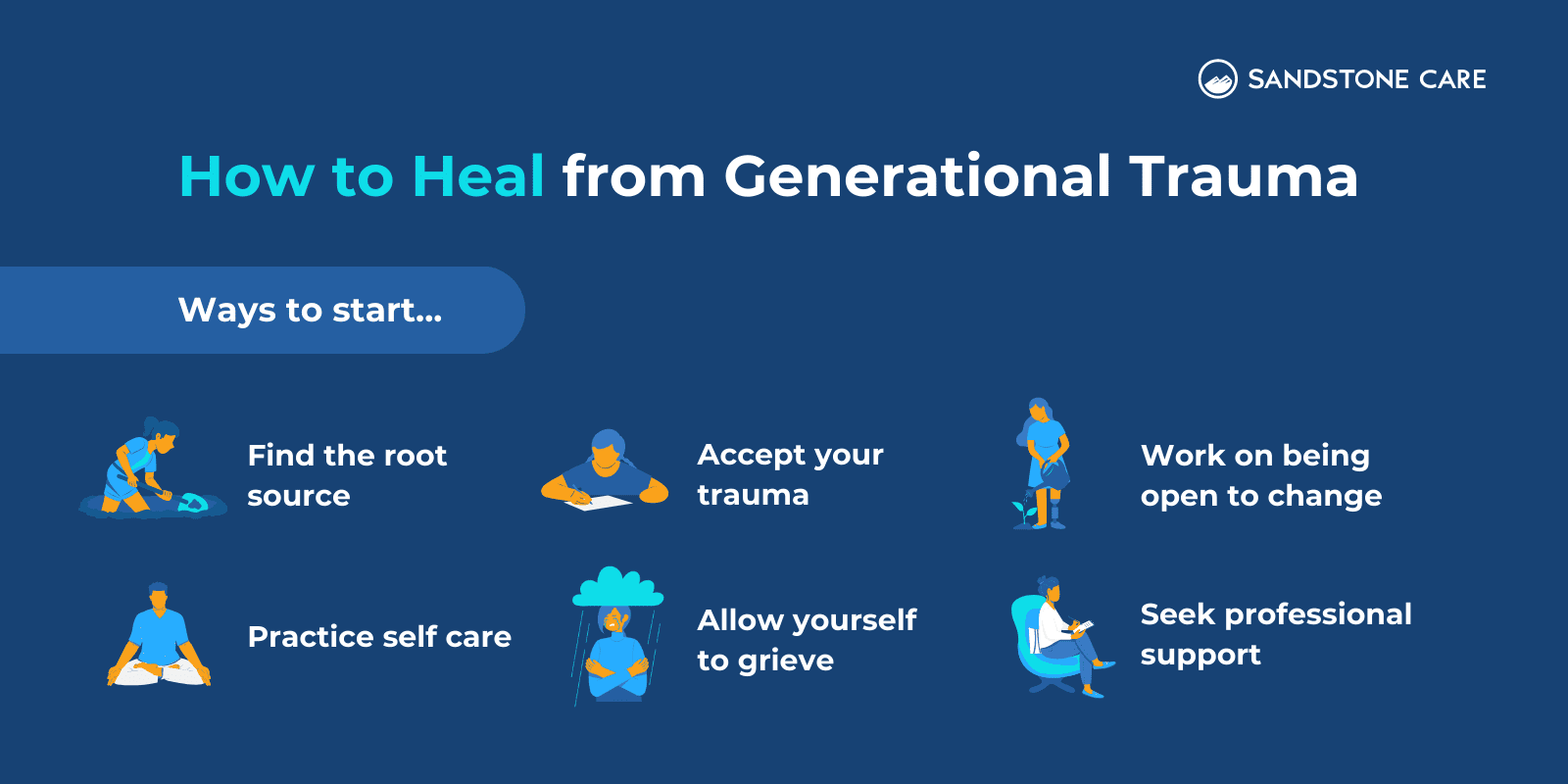
What Are Some Coping Mechanisms You Can Use to Heal Historical Trauma?
There are some tips and techniques that you can use to manage and heal from generational trauma, which can include:
- Learning how to identify, acknowledge, and accept your trauma
- Practicing mindfulness and meditation
- Learning to set boundaries
- Practicing self-care
- Communicating and finding support from others
Historical trauma refers to multigenerational trauma that occurs in specific cultural, racial, or ethnic groups and is related to oppression and major traumatic events like slavery, the Holocaust, forced migration, or the colonization of Native Americans.
Some ways to help heal from historical trauma can include:
- Connecting with people who are strong in the culture and ancestry
- Finding support from others and working through grief together
- Acknowledging your feelings and experiences
If you or a loved one have generational trauma, reaching out for professional support from a therapist, clinician, or another mental health professional is best.
Seeking therapy for generational trauma or historical trauma can help you learn healthy coping mechanisms and begin to heal and break the patterns left by oppression, violence, and discrimination.
Family therapy can also help work to heal the entire family system.
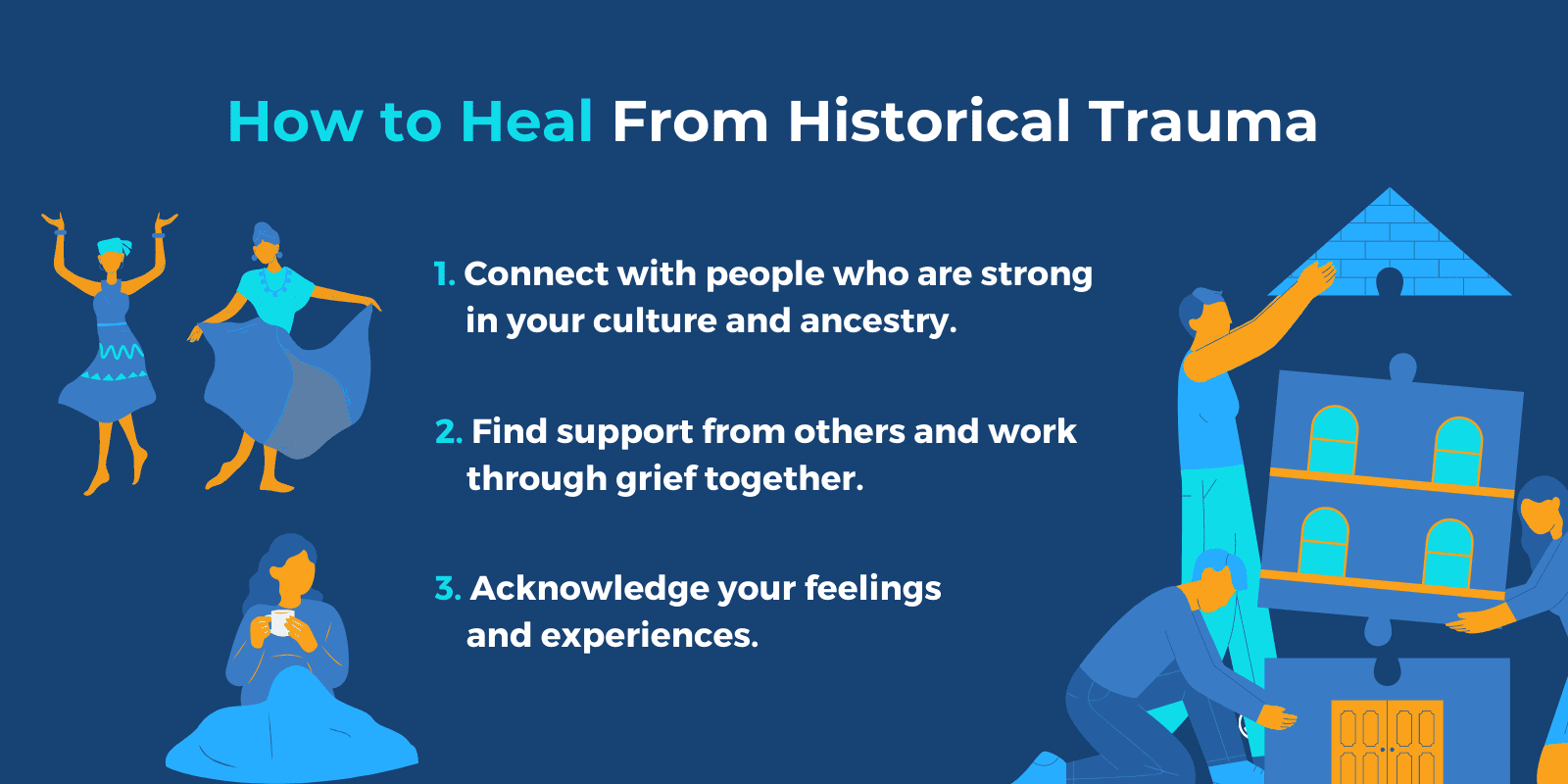
How Long Does It Take to Reverse Trauma?
There is no set timeline for how long it takes to reverse trauma or break generational trauma patterns.
But healing from trauma doesn’t just happen overnight. It can be a long process; for some people, it may be months, and for others, it may take years.
How Many Generations Does It Take to Overcome Trauma?
No minimum or maximum amount of how many generations it takes to overcome trauma exists.
If a person has generational trauma passed down from past generations, whether it be their parents or six generations ago, they can overcome trauma and break the patterns themselves.
If you or a loved one are working through trauma, seek help today. Know that you are not alone and can break the generational trauma pattern and create a new story for you and your loved ones.
Talk to someone you trust and connect to professional support, whether through your healthcare provider, a therapist, or another mental health professional.


Let’s take the next steps together
Generational trauma can lead to negative effects on the health and well-being of future generations. Sandstone Care is here to support teens and young adults with mental health and substance use disorders.

